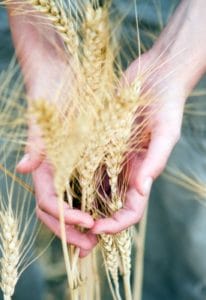Stakeholderforum.org
by Jim Kitchen, Green Ambassador and Project Manager, Soil Association, Northern Ireland

Organic and other agro-ecological farming systems can help the world feed itself, but in addition to changing our farming systems, we need to eat differently, waste less food and change how we feed our livestock. These are the main conclusions from a recent Soil Association report, Feeding the Future.
Today we produce enough food to satisfy the nutritional requirements of every person on the plant. Yet nearly 1 billion people are hungry and another billion are malnourished, most of them living in poor rural areas of the Global South. At the same time, at least a billion people are overweight or obese, mostly resident in richer Western countries.
Predictions indicate that by 2050 there will be 9 billion people in the world. Some have argued that, in order to accommodate for this, we would need to increase our food production by 70%. This argument rests on two assumptions; (i) that there will be no reduction in the consumption patterns of the Global North, (ii) and that the current Western diet, involving much higher quantities of meat and dairy products, will spread to the Global South. But there is another way.
A different system
Right now, 35–40% of all cereals produced worldwide are fed to livestock, and this could rise to 50% by 2050 if meat consumption continues to rise as predicted. If all cereals were fed to people rather than animals, we could feed an extra 3.5 billion people. If meat and dairy consumption were held at levels reached in 2000, 400 million tonnes of cereals would be available for human consumption, enough to feed an additional 1.2 billion people in 2050. Replacing meat mainly fed on grains, with beef, lamb and mutton from animals grazing on grass, would not only provide better quality meat, but also reduce greenhouse gas emissions.
Reducing food waste is also crucial. Globally, around one third of the food produced for human consumption is either lost or wasted. The majority of this wastage occurs in Europe and North America and food wastage low income countries is mainly caused by financial and technical limitations in harvesting, storage, infrastructure and packaging.
Scientists have modelled ways to feed 9 billion people in 2050 on healthy diets, in an environmentally sustainable way. These models have shown that waste reduction could reduce food demand by 25% in richer countries. A further study found that organic agriculture could feed a world population of 9.2 billion in 2050 if relatively modest diets were adopted and equality in food distribution was assured. These scenarios assume that countries like the UK will both produce food differently and eat differently. It is clear, for both environmental and health reasons, that diets must change.
Find out more
Our report ‘Feeding the Future’ provides a summary of the latest research on how organic food can feed the world, while our report ‘Telling Porkies’ looks in detail at claims around the level of future food production needed.
The previous article was written by the British Council’s Green Ambassadors who took part in the closing Earth Debate Dinner, details of which are in article 2. In order to inject international perspectives into the Earth Debates, British Council invited forty delegates from countries around the world, to take part in an all day workshop on Rio+20 and the Earth Debate. Participants discussed the topics covered in the Earth Debates series – adding experiences from their countries – and prepared short statements, which they presented to their tables at the dinner in the evening. The following four articles include short insights from some of the Ambassadors on the aspects of a green economy they believe to be most important.
The above article was written by a British Council Green Ambassador who took part in the closing Earth Debate Dinner, details of which are in article 2. To inject international perspectives into the Earth Debates, British Council invited forty delegates from countries around the world, to take part in an all day workshop on Rio+20 and the Earth Debate. Participants discussed the topics covered in the Earth Debates series – adding experiences from their countries – and prepared short statements, which they presented to their tables at the dinner in the evening. The following four articles include short insights from some of the Ambassadors on the aspects of a green economy they believe to be most important.

